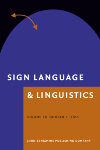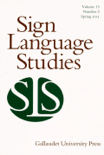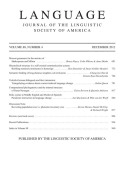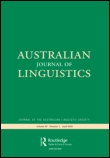
Sign Language & Linguistics
Scope & Guideline
Pioneering Insights into Sign Language and Society
Introduction
Aims and Scopes
- Linguistic Structure of Sign Languages:
The journal explores the diverse linguistic structures of sign languages, including syntax, morphology, phonology, and semantics, contributing to a deeper understanding of how these languages function and differ from spoken languages. - Acquisition and Learning of Sign Languages:
Research on how sign languages are acquired by both deaf and hearing individuals is a key focus, examining the cognitive and social factors influencing language learning and the implications for teaching methodologies. - Iconicity and Gesture in Signed Communication:
The role of iconicity and gestural elements in sign languages is a recurring theme, highlighting how these features contribute to effective communication within the visual modality. - Sociolinguistic Perspectives on Sign Languages:
The journal addresses sociolinguistic dimensions, including language variation, social structures, and the impact of culture on sign language use, emphasizing the interplay between language and society. - Comparative Studies Across Sign Languages:
There is a strong emphasis on comparative research between different sign languages, fostering a typological understanding of their similarities and differences. - Corpus Linguistics in Sign Languages:
The journal promotes the use of signed language corpora for empirical studies, facilitating data-driven analysis of language use and structure.
Trending and Emerging
- Spatial Language and Topographic Structures:
Research focusing on the use of spatial language and topographic structures in sign languages has gained traction, underscoring the importance of spatial cognition in signed communication. - Iconicity and Communication Efficiency:
The investigation of iconicity as a factor in communication efficiency has become increasingly prominent, emphasizing its relevance for understanding how sign languages convey meaning effectively. - Morphological Innovations in Sign Languages:
There is a growing interest in the morphological aspects of sign languages, particularly regarding new word formation strategies and the role of simultaneously produced morphemes. - Neurophysiological and Cognitive Studies:
Emerging studies that integrate neurophysiological perspectives and cognitive science with sign language research are becoming more common, illustrating the interdisciplinary nature of contemporary linguistic research. - Cultural and Social Aspects of Sign Language Use:
Research that delves into the cultural and social dimensions of sign language use, particularly among different Deaf communities, is trending, highlighting the importance of context in language studies.
Declining or Waning
- Negation and Question Formation:
Research specifically focusing on negation and question formation in various sign languages has decreased, suggesting a potential shift towards more holistic or integrated studies of grammatical structures rather than isolated constructs. - Phonological Studies in Sign Languages:
Although phonological aspects remain relevant, there is a noticeable reduction in papers dedicated solely to phonological analysis, possibly indicating a broader trend towards integrating phonology with other linguistic domains. - Traditional Syntax-Driven Approaches:
There has been a decline in traditional syntax-driven studies, which may reflect a growing interest in more innovative or interdisciplinary approaches that consider cognitive and sociolinguistic factors. - Language Contact and Bilingualism Studies:
The exploration of language contact phenomena and bilingualism in sign language contexts appears less frequently, indicating a shift in focus towards more foundational linguistic studies.
Similar Journals

Rasprave
Fostering academic discourse in linguistics and language studies.Rasprave is a distinguished open access journal published by the Institute of Croatian Language and Linguistics in Croatia, dedicated to advancing the field of linguistics and language studies. With an ISSN of 1331-6745 and E-ISSN 1849-0379, the journal has embraced open access since 2007, making its research widely available to scholars globally. It holds an important position in the academic community, particularly noted for its 2023 Scopus ranking within the Arts and Humanities and Social Sciences categories, falling into the 59th and 56th percentiles respectively. The journal’s impact is further reflected in its Q3 quartile ranking in linguistic and language studies, showcasing its relevance and growing influence in this vibrant field. Rasprave aims to publish innovative research that deepens understanding of language dynamics, linguistic theory, and sociolinguistics, making it an essential resource for researchers, professionals, and students seeking to enrich their knowledge and contribute to the academic discourse surrounding language.

Sign Language Studies
Elevating the discourse on sign language and society.Sign Language Studies is a prestigious peer-reviewed journal dedicated to advancing the field of sign language research and the linguistic studies surrounding it. Published by Gallaudet University Press, this journal stands out in the realms of Linguistics and Language, being classified within the Q2 category as of 2023, which underscores its influence and relevance within academic circles. Operating under the ISSN 0302-1475 and E-ISSN 1533-6263, the journal has a remarkable Scopus ranking that positions it in the top 20% within the disciplines of Arts and Humanities and Social Sciences, attesting to the high quality and impact of its publications. Spanning a comprehensive timeline from 2002 to 2024, Sign Language Studies invites researchers, professionals, and students to engage with cutting-edge research, theoretical frameworks, and practical studies that contribute to our understanding of sign languages, their structure, use, and the communities they serve. This makes it an essential resource for those committed to the exploration and appreciation of sign language within both linguistic and social contexts.

Journal of Portuguese Linguistics
Advancing Knowledge in Portuguese LinguisticsThe Journal of Portuguese Linguistics is an esteemed peer-reviewed academic journal published by UBIQUITY PRESS LTD, dedicated to the exploration of the rich complexities of the Portuguese language and its various linguistic dimensions. With an ISSN of 1645-4537 and an E-ISSN of 2397-5563, this open-access journal has been disseminating valuable research since 2002, ensuring that knowledge is accessible to all scholars, professionals, and students interested in Linguistics. Based in Portugal, it features a distinct focus on the linguistics pertinent to the Portuguese language, facilitating discussions that span theoretical and applied interests. The journal holds a respectable Q3 quartile rank in the field of Linguistics and Language, reflecting its growing significance and contribution to academia, as evidenced by Scopus rankings that place it in the 71st and 68th percentiles in Arts and Humanities as well as Social Sciences. Researchers and practitioners alike will find Journal of Portuguese Linguistics to be an indispensable resource for fostering discourse and innovation in the study of language.

RLA-Revista de Linguistica Teorica y Aplicada
Cultivating interdisciplinary insights in the study of language.RLA-Revista de Linguística Teórica y Aplicada, published by Universidad de Concepción, Facultad de Humanidades y Arte, stands as a vital resource in the field of linguistics, delivering cutting-edge research and scholarly articles that contribute to both theoretical and applied linguistics. With its ISSN 0718-4883, this journal aims to foster robust discussions and innovations in linguistic theory, language acquisition, sociolinguistics, and applied linguistics methodologies. Although the journal currently does not provide open access options, it endeavors to reach a diverse audience, including researchers, professionals, and students, who are keen to explore the rich tapestry of language studies. By offering insights from both local and global perspectives, RLA does not only advance linguistic discourse but also encourages interdisciplinary collaboration, thereby solidifying its role as a pivotal publication in the linguistic academic community.

Glottometrics
Fostering Innovation in Language Studies with Statistical RigorGlottometrics is an esteemed academic journal dedicated to the intersection of linguistics and quantitative methods, published by the International Quantitative Linguistics Association (IQLA). Based in Germany, this journal serves as a vital platform for researchers and professionals in the fields of linguistics and applied mathematics, fostering the exploration of quantitative approaches to language studies. With its impact factor reflecting its commitment to high-quality research, Glottometrics has established a robust presence in the academic community, as denoted by its categorization in the Q2 quartile in Linguistics and Language and Q4 in Applied Mathematics. While the journal operates on a subscription-based model, it has made significant strides in the ranking hierarchy, securing positions in the 44th to 48th percentiles across various relevant categories in Scopus. Spanning the years 2017 to 2024, Glottometrics invites contributions that harness innovative quantitative methodologies for linguistics research, making it an essential resource for students, researchers, and professionals engaged in the dynamic analysis of language.

Voprosy Yazykoznaniya
Fostering Scholarly Dialogue in Language StudiesVoprosy Yazykoznaniya, published by the esteemed Russian Academy of Sciences and the State Academy of Humanities (GAUGN), stands as a leading journal in the field of linguistics and language studies. With an impressive Q2 rank in Linguistics and Language for 2023 and a strong position within Scopus rankings, this journal fosters scholarly dialogue and pushes the boundaries of linguistic research by providing a platform for innovative studies, reviews, and analyses. Although not open access, its publication ensures high academic standards and visibility within the global academic community. Researchers, professionals, and students alike can benefit from the rich insights and diverse perspectives presented in this journal, serving as a vital resource for anyone interested in the intricacies of language and its role in society. Operating since 2009 and continuing to 2024, Voprosy Yazykoznaniya is an essential reference point for contemporary linguistic scholarship in the Russian Federation and beyond.

Jezikoslovlje
Exploring the Frontiers of LinguisticsJezikoslovlje, published by the Josip Juraj Strossmayer University, Faculty of Philosophy in Croatia, is an essential publication in the field of Linguistics and Language Studies. Launched in 2008 and extending its contributions to the academic community through 2024, this journal addresses a spectrum of linguistic research, facilitating scholarly dialogue around both theoretical and applied aspects of language. With a current Scopus ranking placing it in the 54th percentile in the Arts and Humanities and the 50th percentile in Social Sciences, Jezikoslovlje serves as a vital resource for researchers and students looking to engage with contemporary linguistic issues. Although it operates under a traditional access model, its indexed presence and rigorous peer-review process ensure that published works maintain a high scholarly standard, inviting contributions that advance understanding in this dynamic discipline. The journal's commitment to fostering knowledge in linguistics makes it a significant platform for academics in Croatia and beyond.

LANGUAGE
Exploring the Depths of Language and TheoryLANGUAGE, published by the Linguistic Society of America, is a premier academic journal dedicated to the rigorous study of linguistic theory and practice. With an ISSN of 0097-8507 and E-ISSN 1535-0665, this esteemed journal has established itself as a leading publication in the field of linguistics since its inception. The journal has consistently maintained a high impact factor, being ranked in the Q1 category in Linguistics and Language for 2023, placing it among the top tier of academic journals. Notably, it also holds impressive Scopus rankings, being positioned at #75 out of 1088 in Arts and Humanities, and #89 out of 1167 in Social Sciences, demonstrating a significant impact and reach in the discipline. While it is not an open-access journal, LANGUAGE provides crucial insights into linguistic research, fostering a vibrant academic community. Spanning years from 1996 to 2024, it continues to be an essential resource for researchers, professionals, and students alike, aiming to advance the understanding of language in its myriad forms and functions.

Australian Journal of Linguistics
Shaping the Future of Linguistic InquiryThe Australian Journal of Linguistics, published by Routledge Journals, Taylor & Francis Ltd, stands as a distinguished platform in the field of linguistics, fostering rigorous academic discourse since its inception in 1981. With an ISSN of 0726-8602 and an E-ISSN of 1469-2996, the journal has achieved a notable Q2 ranking in the linguistics and language category for 2023, indicating its quality and relevance within the academic community. With a Scopus ranking of #316 in Arts & Humanities and #373 in Social Sciences, it sits in the 71st and 68th percentiles respectively, underscoring its impact in the fields it encompasses. The journal aims to publish high-quality research articles that contribute to the understanding of linguistic theory, sociolinguistics, and applied linguistics, making it an essential resource for researchers, professionals, and students alike. The journal is based in the United Kingdom, at 2-4 Park Square, Milton Park, Abingdon OX14 4RN, Oxon, England, and actively encourages contributions that can expand the current linguistic discourse, reinforcing its commitment to highlighting diverse perspectives in language research.

Glossa-A Journal of General Linguistics
Unlocking the Secrets of Language and TheoryGlossa: A Journal of General Linguistics, published by the Open Library of Humanities, stands as a leading voice in the realm of linguistic research since its inception in 2016. With its Q1 category ranking in Linguistics and Language and impressive Scopus ranks encompassing the top 83rd and 81st percentiles in its respective fields, Glossa fosters a vibrant academic community committed to the rigorous exploration of language and linguistic theory. Operating under an open access model, the journal not only enhances the visibility of groundbreaking research but also ensures that valuable insights are accessible to a global audience. The journal's commitment to interdisciplinary dialogue makes it an indispensable resource for scholars, professionals, and students eager to engage with contemporary developments in linguistics. As it converges into 2024, Glossa continues to champion innovative scholarship and critical discourse that challenges conventional boundaries within the field.